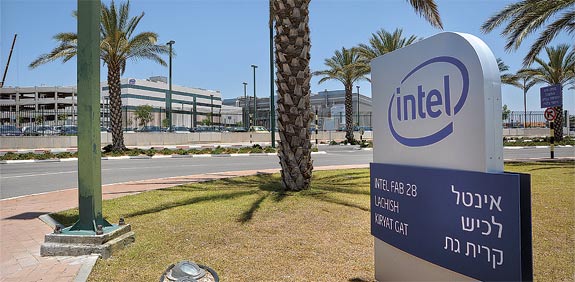Intel Corp. announced Tuesday its most advanced, next-level processor, whose development was led by its facility in Haifa, Israel, with the promise of a double-digit rise in computer performance, longer battery life and better security.
The seventh-generation new Intel Core enhanced 14-nanometer-plus processor, called Kaby Lake, is its “strongest and fastest ever,” Intel said in a statement, and aims to meet the demands of increased connectedness and internet use, and growing consumption of high-quality video, ultra-high-definition (UHD) premium and user-generated content, 360-degree video formats, Virtual Reality and digital sports content. It will power ultra-thin notebooks and two-in-one laptop-tablet hybrids.
 Built on the foundation of the Skylake processors, which Intel launched last year and were also led from Israel, the Kaby Lake processors are more than 70 percent faster than a 5-year-old PC and 3.5 times better in 3D graphics performance, the company said in a statement.
Built on the foundation of the Skylake processors, which Intel launched last year and were also led from Israel, the Kaby Lake processors are more than 70 percent faster than a 5-year-old PC and 3.5 times better in 3D graphics performance, the company said in a statement.
The new processors will have a longer-lasting battery — 9.5 hours of 4K video playback — and better security, and will enable more natural and intuitive interactions of users with their PCs, Intel said.
“The seventh-generation processors push our performance forward,” Ran Senderovitz, general manager at Intel Israel Development Centers, said in a phone briefing with reporters.
The Israeli team, with its colleagues worldwide, has pushed the boundaries of “global technology to new places,” he said. “We are talking about amazing technologies, technologies of 14nm. So it is like taking a hair and dividing it by 8,000.”
The new processors increase productivity with an up to 12 percent faster speed for application processes compared to the previous, sixth-generation, Intel processors, and an up to 19% faster speed for internet use, Senderovitz said. “To present year after year a double-digit performance improvement requires a lot of innovation and determination,” he said.
The challenge of the Israeli team, which led the efforts and worked in collaboration with Intel’s other global developers, was to make these processors faster and more energy-efficient and also support high-quality video and virtual reality, as required by users today.
“Today computers are at the center of our creativeness,” Senderovitz said, used for everything from editing music to viewing and creating UHD video content and gaming.
Israel has traditionally been an important development center for Intel, with local teams coming up with some of the company’s most important products – among them the Sandy Bridge and Ivy Bridge processors, and last year’s Skylake, which are in many of the computers currently in use.
Kaby Lake will allow computers to dispense with a fan and have a small battery, making them light and thin, some of them just 7 millimeters thick and weighing 1.3 kilograms.
“We are getting closer to a level in which computers are becoming as thin as smartphones,” Senderovitz said.
The first computers with the new processors are expected to hit the market in September and will be aimed initially at private customers and small and medium businesses.
Intel expects to see over 100 computer designs using the Kaby Lake in the fourth quarter of the year. Additional products, targeted at enterprises, workstations and enthusiasts’ notebooks and desktops, are expected in January, Intel said.
The processors will be included in a variety of designs and price ranges, which may also include features like hassle-free facial recognition and Intel’s Thunderbolt 3 technology, a single-wire USB Type C connection that supports up to 40 Gpbs transfer speeds. The processors will also allow some PCs to offer users touch, voice and stylus interaction, Intel said.
Intel has been operating in Israel since 1974 and directly employs around 10,000 workers in its Kiryat Gat production center and in four development centers, in Haifa, Yakum, Jerusalem and Petah Tikva. The Haifa center is Intel’s largest outside the US.